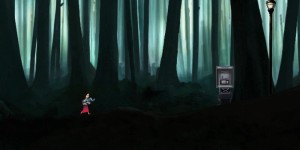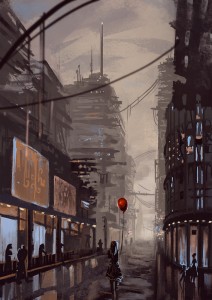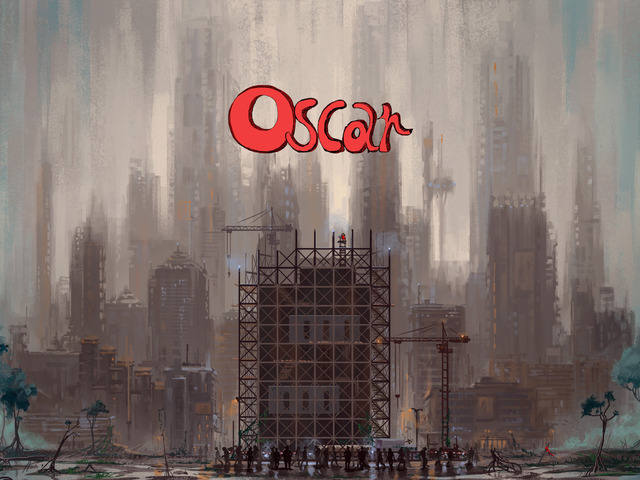 We recently posted an announcement about Oscar, a 2D platformer from Team Sharkeye that’s currently seeking $40,000 worth of funding on Kickstarter. At first blush Oscar is just another 2D platformer in an already crowded market. However, the team has gone out of their way to point out that Oscar is something different; an adult game that is mature in how it approaches its storytelling, not just because of violence or overt sexualization. Obviously a developer saying their game is something is often far different from reality – read any 90’s Dave Perry interview to see that – but we’re hoping Oscar is something different. We recently had the opportunity to talk to Joshua Long, Oscar’s lead developer, about a variety of subjects, including whether he can keep his promises.
We recently posted an announcement about Oscar, a 2D platformer from Team Sharkeye that’s currently seeking $40,000 worth of funding on Kickstarter. At first blush Oscar is just another 2D platformer in an already crowded market. However, the team has gone out of their way to point out that Oscar is something different; an adult game that is mature in how it approaches its storytelling, not just because of violence or overt sexualization. Obviously a developer saying their game is something is often far different from reality – read any 90’s Dave Perry interview to see that – but we’re hoping Oscar is something different. We recently had the opportunity to talk to Joshua Long, Oscar’s lead developer, about a variety of subjects, including whether he can keep his promises.
Cliqist : From professional gamer to professional game designer. I’m pretty sure that’s every kids’ dream growing up. Why strike out on your own?
Joshua Long : Phew, well, do you want the long answer or the short answer? The long answer I personally think is insightful and awesome, though from experience in other e-mail interviews it’s also more than a thousand words. The short answer is having gone from peon to lead multiplayer designer, I had a chance to see the process by which the industry makes games. I expected like anything from figure-skating, to violin, to football, there would be rules and guidelines about how to be effective and how to improve yourself; instead I found a bunch of guys making gut decisions, which I feel directly causes a lot of problems like overtime and making ‘safe’ decisions in what games can entail. Having been one of those guys who tries to make life liveable for a team while keeping the project interesting, it felt pretty impossible. All the business trips and butlers watching me eat my breakfast at swanky hotels couldn’t make up for the fact that it was very personally taxing to be a part of the problem. We eventually hired a design director (Alex Mandryka – Farcry, Rainbow Six) to help mend process at the studio and I was able to see why changing not just games, but more fundamentally how we make them, will only be able to improve through small groups of people testing and refining better methods. I’m not going indie to make a bunch of personal projects (though that’s great and satisfying in and of itself), I’m indie because when I was a kid I could sit down with 5 games and have my mind blown. Now I wait 5 years between titles that put me in that same state of awe, and rather than complain about it (as I did for many years), I realized I had the opportunity to try and change the situation.
 Cliqist : What makes the game you’re working on, Oscar, special?
Cliqist : What makes the game you’re working on, Oscar, special?
Joshua Long : As I alluded to above, it’s the chance to show good design process through results; ultimately no one’s going to listen if I publish just another blog about how to approach design. I want to share Alex’s process as something I learned to design highly mechanical games like RTS, and yet has so many applications to even projects about expressing the human experience. Oscar is the story of a friend that I wish was fictional; it’s hard to think about sometimes. Childhood troubles really hit home because we’ve all been that kid who told his parents they were okay even when they’re weren’t. I think games as art provide means to take the ugly and painful parts of being human and transforming them into something we can absorb and appreciate. I want Oscar to be fun, but I want people to take something meaningful out of it. I think acknowledging that everyone has problems they can’t explain and carry around with them will help encourage and heal a lot of people.
Cliqist : While you give some story details on your Kickstarter page, it stills seems like a bit of a mystery. Can you give us some more details?
Joshua Long : Oscar is a big mystery, down to its very simple portrayal. We don’t think offering something suspiciously experimental is the right way to get people to try something different; to a Steam user this needs to look like just another quaint 2D platformer. We introduce the narrative by playing with their comfort level; while they begin in what feels like an umpteenth childhood fantasy setting, we slowly insert items and interactions that don’t fit together with this assumption of the world. As the player’s discomfort consciously (and also subconsciously) makes them seek further understanding of why and how the world is so strange, we let them discover for themselves what Oscar’s going through. At that point it’s kind of like Fight Club or Memento, where you’ll want to go back and peruse all the subtle details that might have tipped you off all along had you known what to look for.
I don’t want to spoil too much but Oscar goes through problems that are a bit overwhelming for a child; she tries to explain them to people with her limited understanding, but we learn through playing the game why she is ignored and feels like she can’t consult those closest to her. How many parents want their kids to speak up about their problems because it’s obvious they’re unhappy for some unclear reason? As adult gamers we’re able to both identify what she’s going through, as well as why her situation plays out like it does, silently.
 Cliqist : It seems that when people try and make “grown up games” they’re just depressing. Why is that?
Cliqist : It seems that when people try and make “grown up games” they’re just depressing. Why is that?
Joshua Long : Great question, and I mean that. We brought our story to artists with much more (life) experience for feedback on that subject. Oscar allows people to understand why these unfortunate events befall many children without us being able to do anything about it, but many friends closest to us said that art needs to be more than that. While it’s important that we portray Oscar’s situation as a reality for many youths today, we did make a strong effort to resolve the game’s narrative with a silver-lining of hope. I think to say all “grown up games” are depressing more speaks to games’ current inability to express sad emotions and situations; as they say, all happy families are the same while every unhappy one is dysfunctional in its own way. It’s really hard to make games about real issues without simplifying into something like “let’s just talk about all the bad stuff”, or at least that’s my initial impression. If you look at a masterful game like Silent 2 where a man’s guilt over killing his ill-wife manifest in a monstrous and terrifying manner, the game is all about resolution and facing your fears for the people you care about. It’s not meant to be something as simple as “depressing”. I think the darkness overshadows the happy parts of games because they’re less common and stand out, but also because just like in real life it’s hard to accept that sometimes the pain of living is also part and parcel with the joy. Great question though, I suspect it’ll be both audiences and developers that will need to mature past this ‘hurdle’.
 Cliqist : With all of that being said, why make Oscar a 2D platformer? That’s a pretty crowded market.
Cliqist : With all of that being said, why make Oscar a 2D platformer? That’s a pretty crowded market.
Joshua Long : Oscar is a 2D platformer to begin with and certainly as development began we weren’t considering changing the mechanics; I will note that the game prioritizes anything that helps convey the story to the player without ever directly calling it out; no journals or audio logs to be found here. The game shift from 2D to 2.5D, to a point in the game where Oscar controls herself and you manipulate the environment around her – But how would we advertise that? Genres are convenient from a production standpoint, or for marketing so that players can estimate what kind of experience they’re going to get. Oscar is focused on the player experience and that alone, and everything else is up in the air pretty much only limited by our technical expertise.
That said we wanted Oscar to be 2D because it allows for much more artistic flexibility. Not only do the settings of each level change, but along with location we change the art style. The world needs to convey what she’s feeling, as the more fantastic areas have an impressionistic style while the more serious moments feature very realistic drawings. One of the pities of concept art is that the game rarely captures the same feel by the time it’s produced; with a simple 2D art pipeline where the art style and emotions change as a huge part of delivering the narrative, we can simply insert evocative backgrounds into the game a-la-carte. It gives our artists freedom to explore creative solutions about how to imply certain things about a young girl’s emotional journey as it shifts from scene to scene, without having to worry about wrapping a texture around a rock and seeing if it generates the same emotional effect.
We did what was best for the game; I don’t think another genre would have afforded us the flexibility to produce something of quality with a budget of pretty close to nothing. That said we want the game to look pretty because the 2 years of substance we crafted showed amazing and surprising results that we feel should be exposed to many, thus requiring a Kickstarter campaign to fund more artistic muscle. We never wanted the funding but a certain bar of visual quality will go a long way to getting noticed at a superficial level, where most games live.
Cliqist : Is there any chance that we’ll see a console version?
Joshua Long : Absolutely. Indies have gone through a rough period where support was anything from difficult to impossible on consoles; my how times have changed. The game is developed in Unity, and luckily at my old day job I was able to work with programmers on porting tasks; it’s not that hard to propagate to other platforms and if our funding is successful we’d love to take the extra time to show up on everything from PSN to Linux.
 Cliqist : As this writing you’re at about $7,000 in funding, but $5,000 is from a single backer. Does that worry you?
Cliqist : As this writing you’re at about $7,000 in funding, but $5,000 is from a single backer. Does that worry you?
Joshua Long : Umm, I’d be lying if I said it didn’t but as I mentioned we’re not a flashy or gimmicky game that’s going to grab people’s attention that way; we didn’t spend all of our initial resources on looking pretty because we didn’t think we’d reach a position where the game would need a much more concerted effort to fully realize. I’ve worked with press so much in the first couple of days and I really want to believe that substance can triumph over style; we’re relying on word of mouth and a very active Kickstarter campaign with lots of twittering, blogging, interviews and features on the site. I don’t know if it will work out to be honest, who knows really but to be honest in life and certainly in my career I’ve been through scrapes that make this seem like a walk in the park. I make sure not to get too high or too low; I just keep an eye out for how we can adjust to more effectively attract backers and/or press attention.
All in all I made this game for a lot of reasons, one of which was to get the childhood story of a friend out there. Even if everything falls apart it’s already been such a rewarding experience taking a big leap of faith, one that’s already helped Oscar’s story get out there to other people in the world. Knowing a person who’s used to being ignored is having her story shared with others has been reward enough.
Cliqist : Do you have any final words for someone that might be on the fence about backing Oscar?
Joshua Long : Well, as much as no one likes walls of text, I think if you read my reasoning’s (in interviews such as this or on our site) as to why and how we’re building this project, hopefully that gives you confidence in our ability to deliver something unique. I’m not some guy in a basement hoping you’ll like my game; I’m a confident developer who undid his jaded industry perspective by finding a route through which he think games can grow.
Oscar is only the beginning of a career spent making games more meaningful. I look to someone like Jenova Chen who went from FlOw to fl0wer to Journey; It takes time to develop new paradigms. I can’t promise Oscar will be perfect but I know it will draw notice from people who want more from their experiences. Lastly, I don’t treat this project as strictly a success or failure; no matter what, games that are meaningful will be my passionate pursuit for life. Whether Oscar is an unpredictably smashing success and a leap forward in games, or just a small step in a longer journey, I plan to keep going until well, I’m too old. Or something.
Cliqist : Can you close us out with an Oscar inspired Haiku?
Joshua Long :
Children without voice
Speak to no one at all but
the Oscar in us
[divider]Thanks to Joshua for taking the time to answer our questions!
You can learn more about Oscar on the Oscar Kickstarter page. Funding is running until March 29th and has a goal of $40,000.




[…] You can learn more about Oscar by checking out our previous coverage of the game, including an interview with the lead developer Josh […]